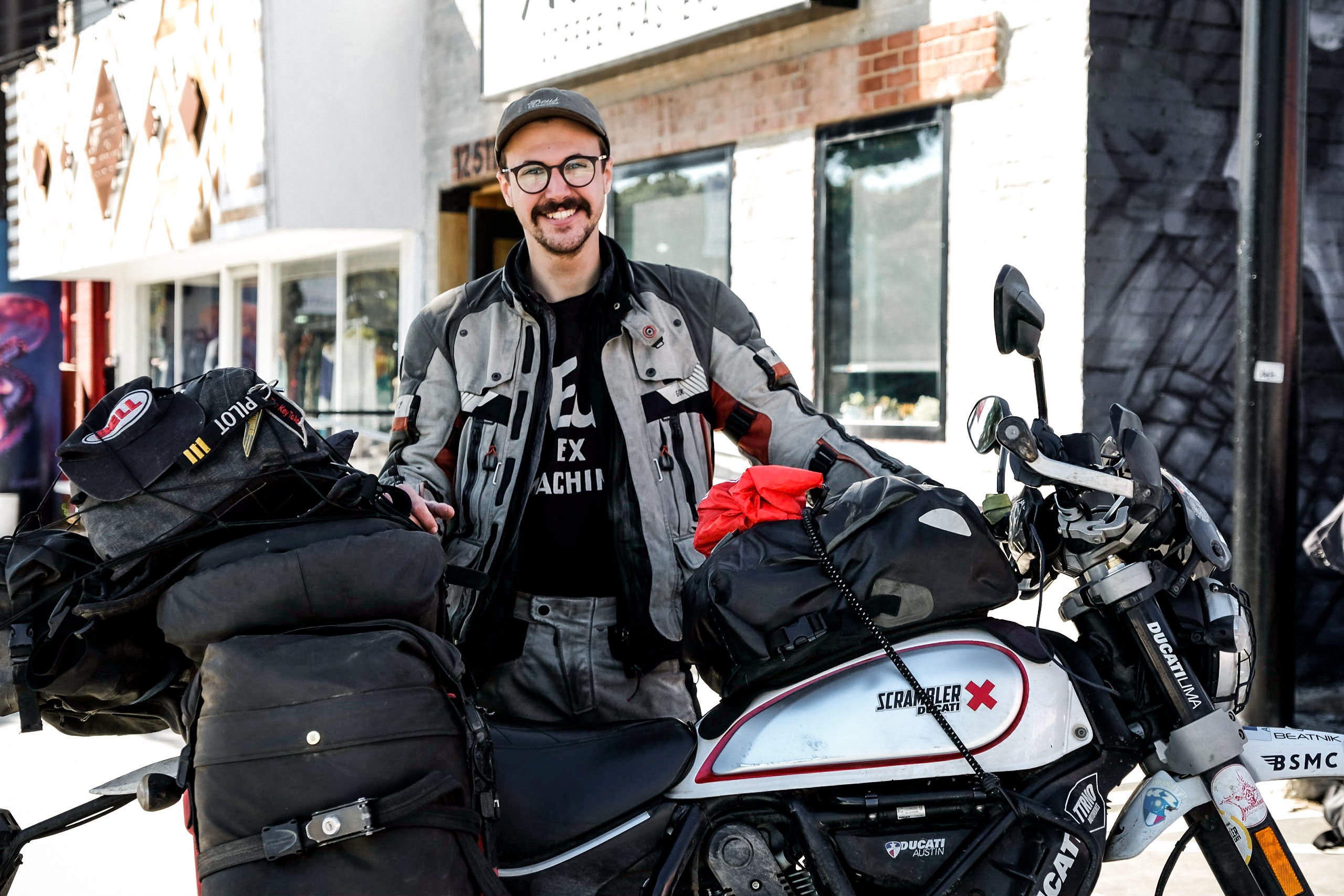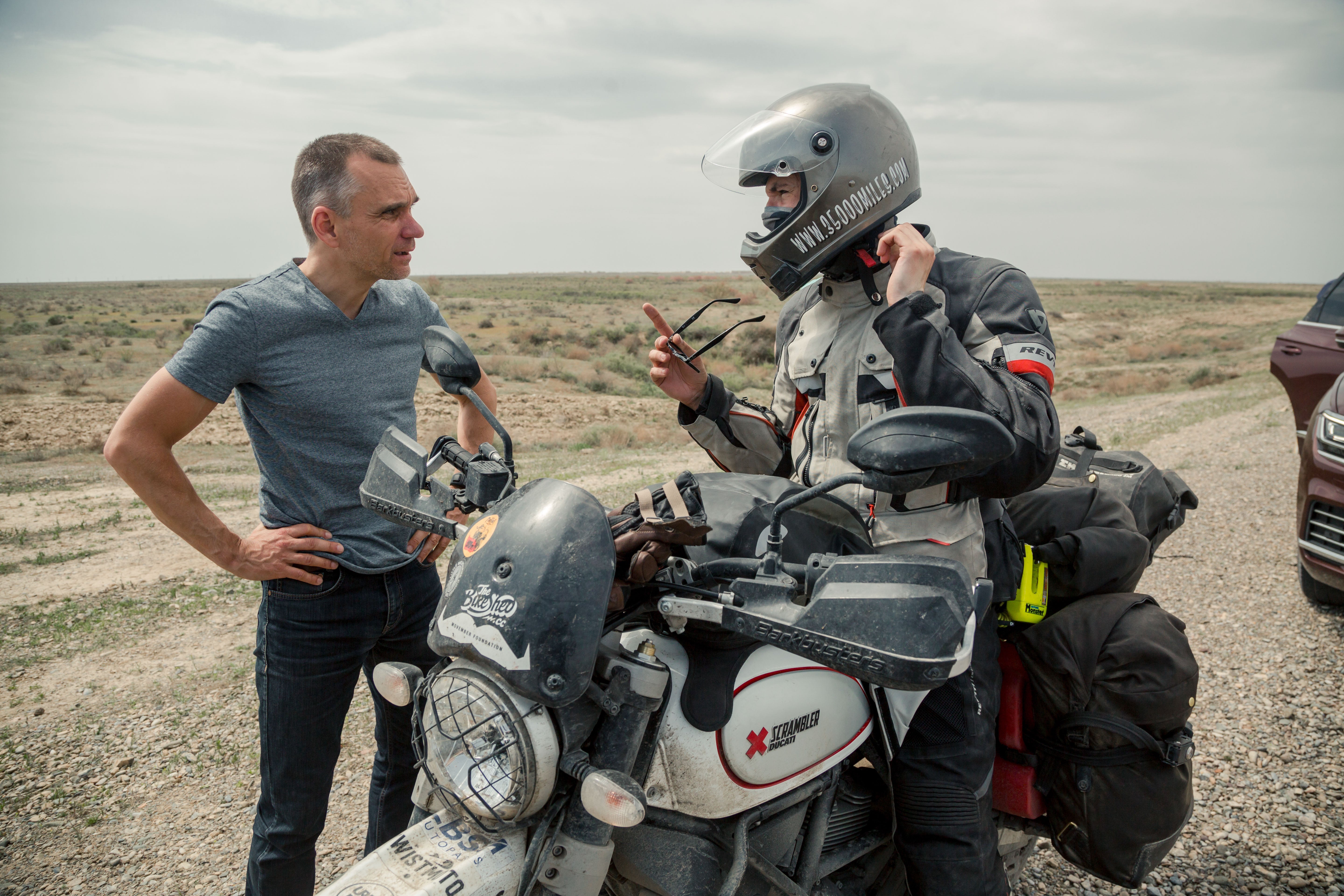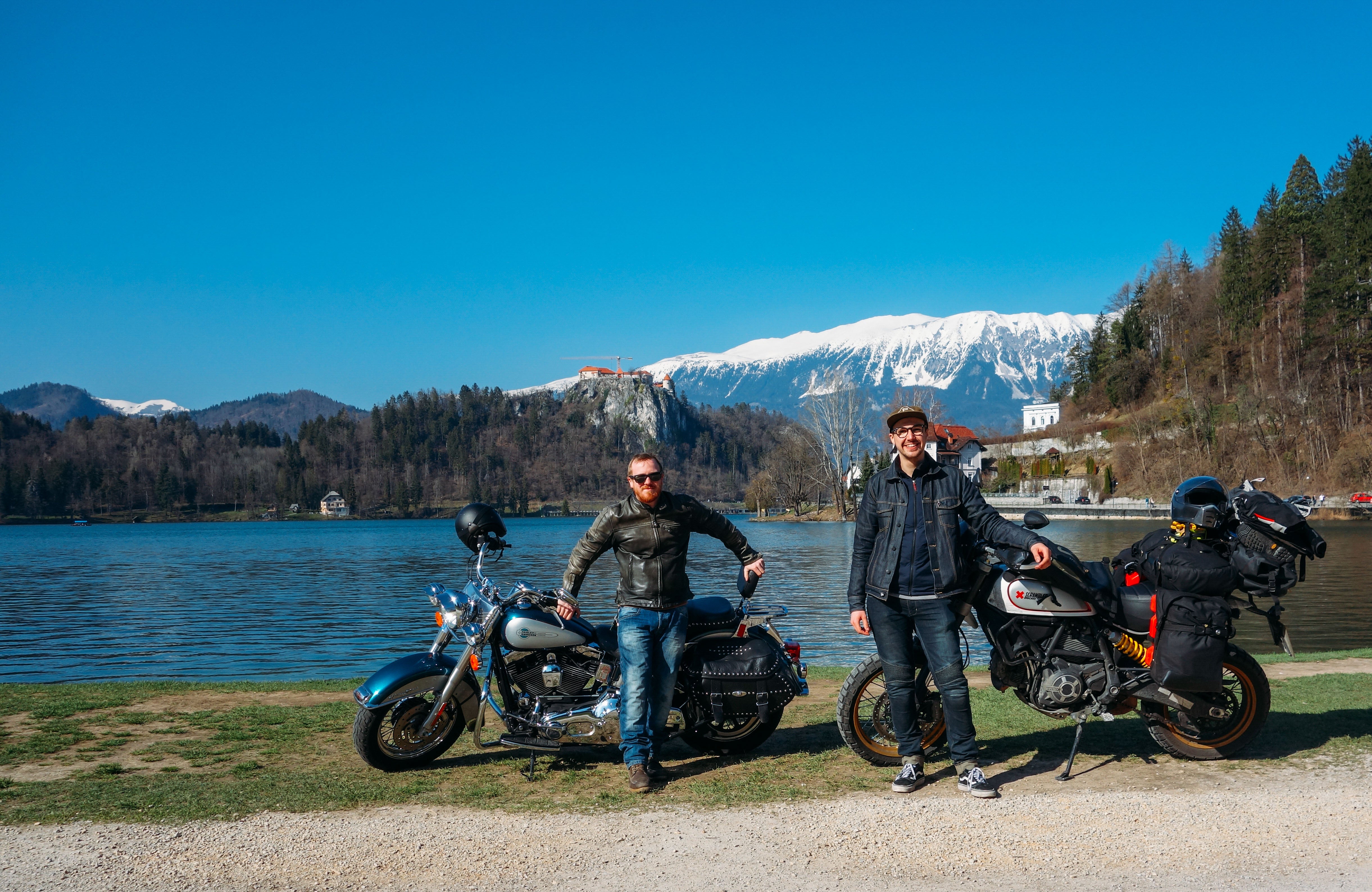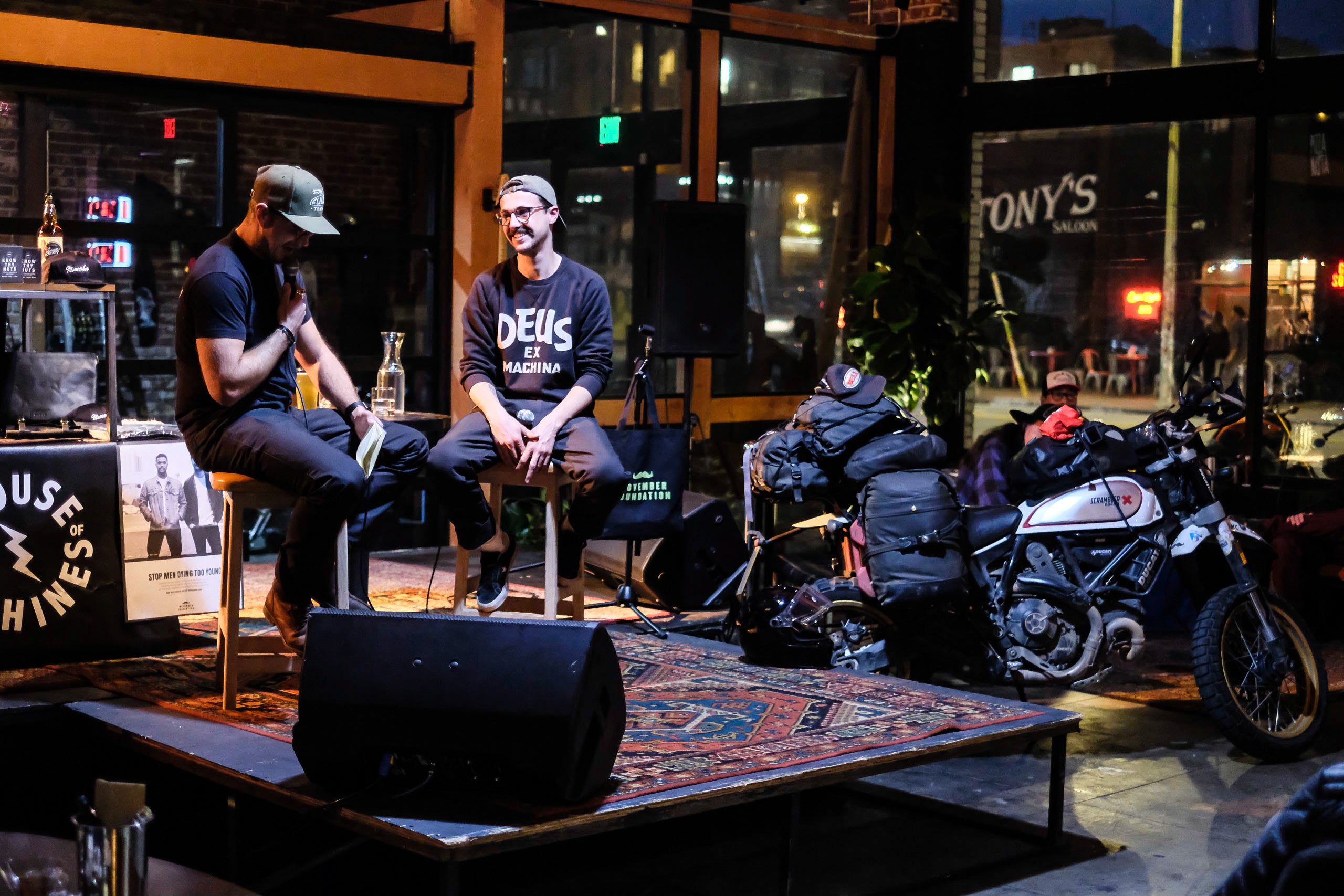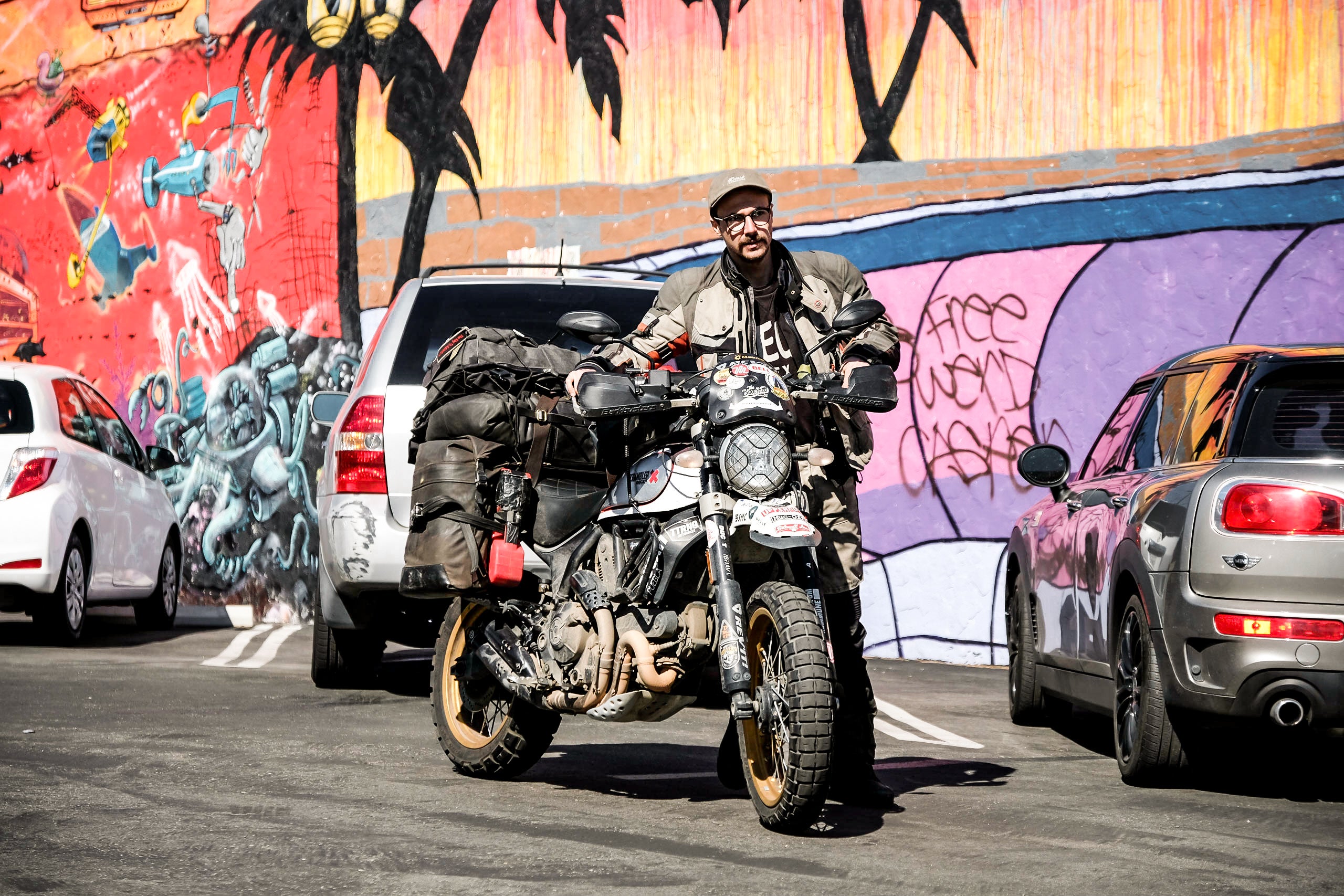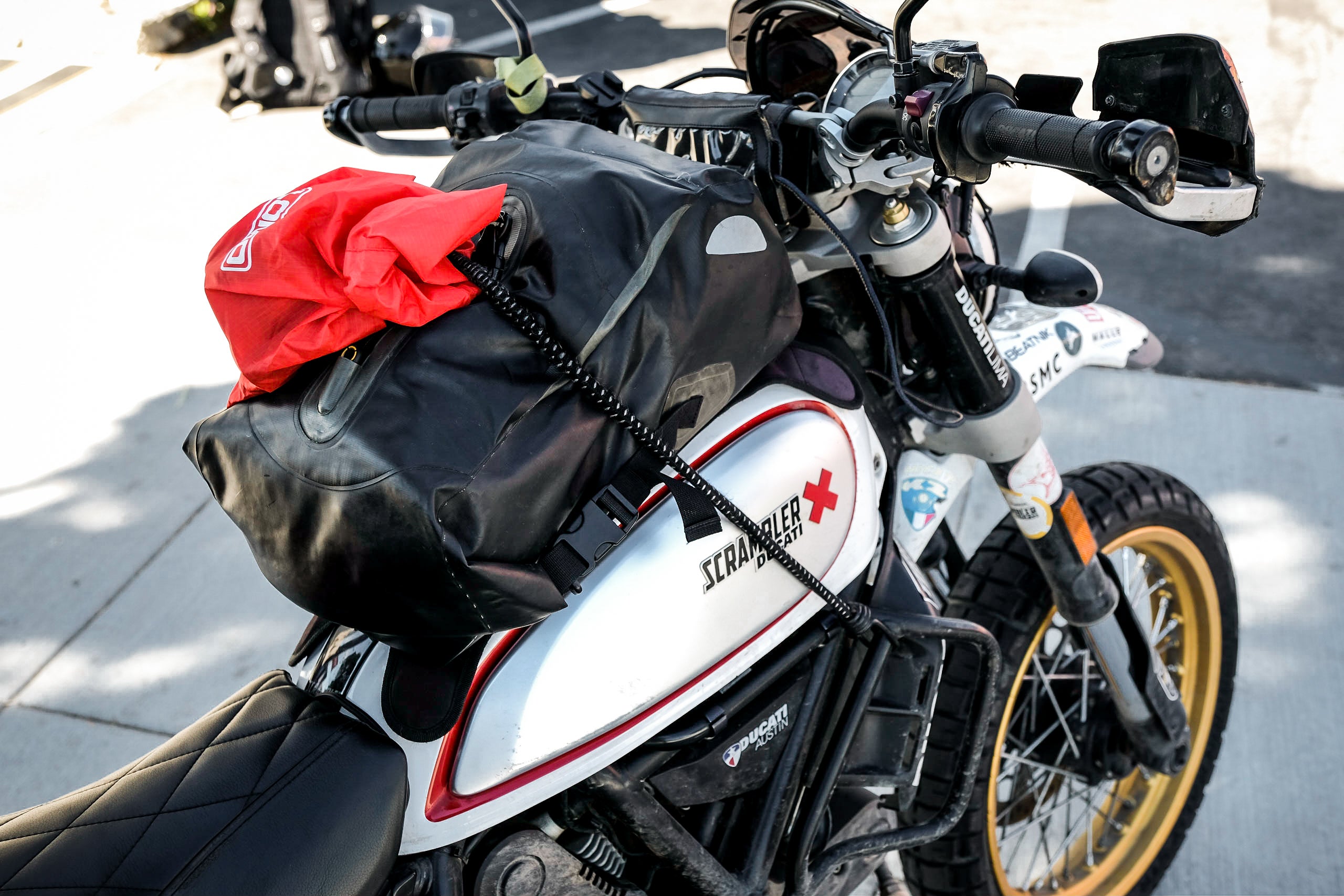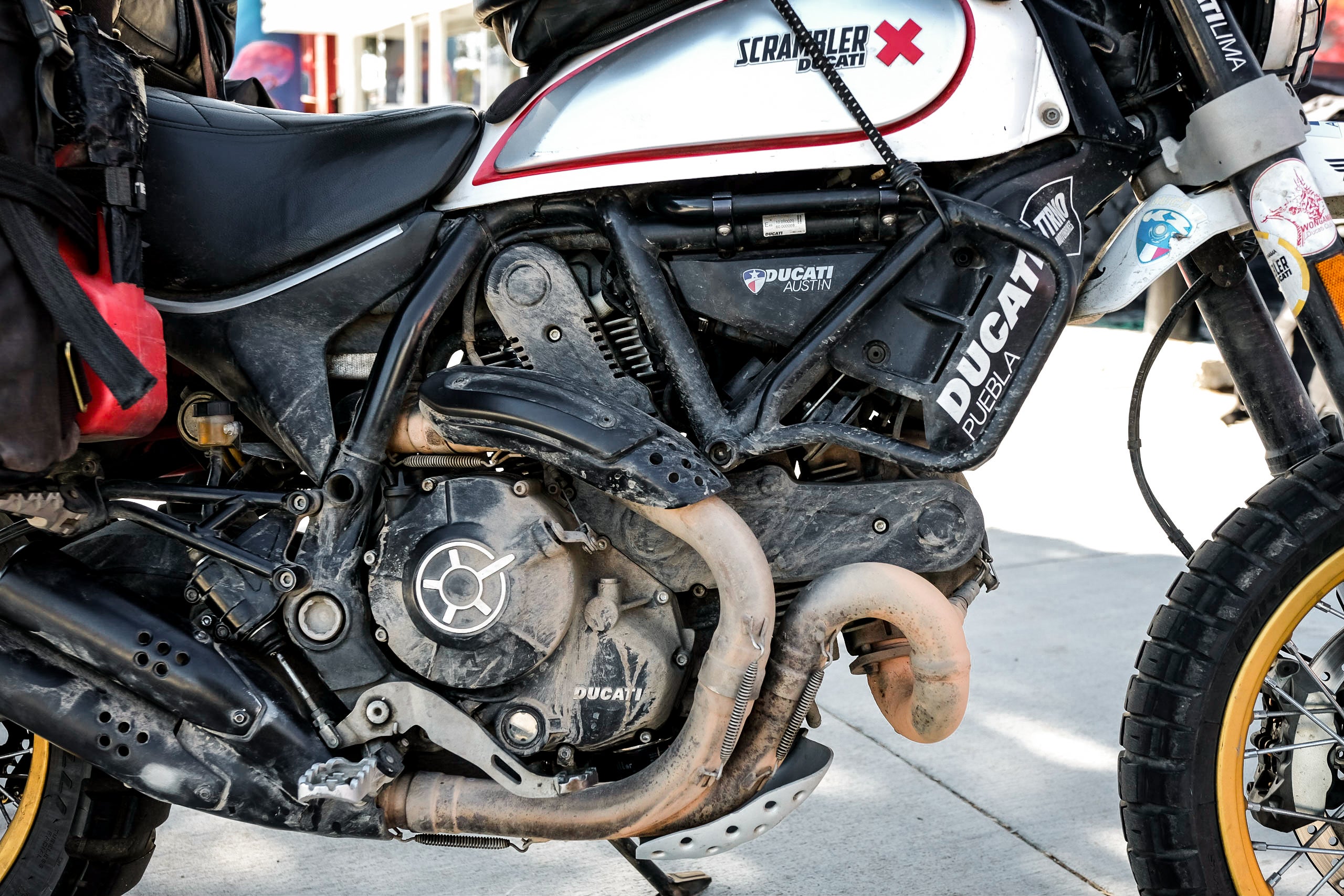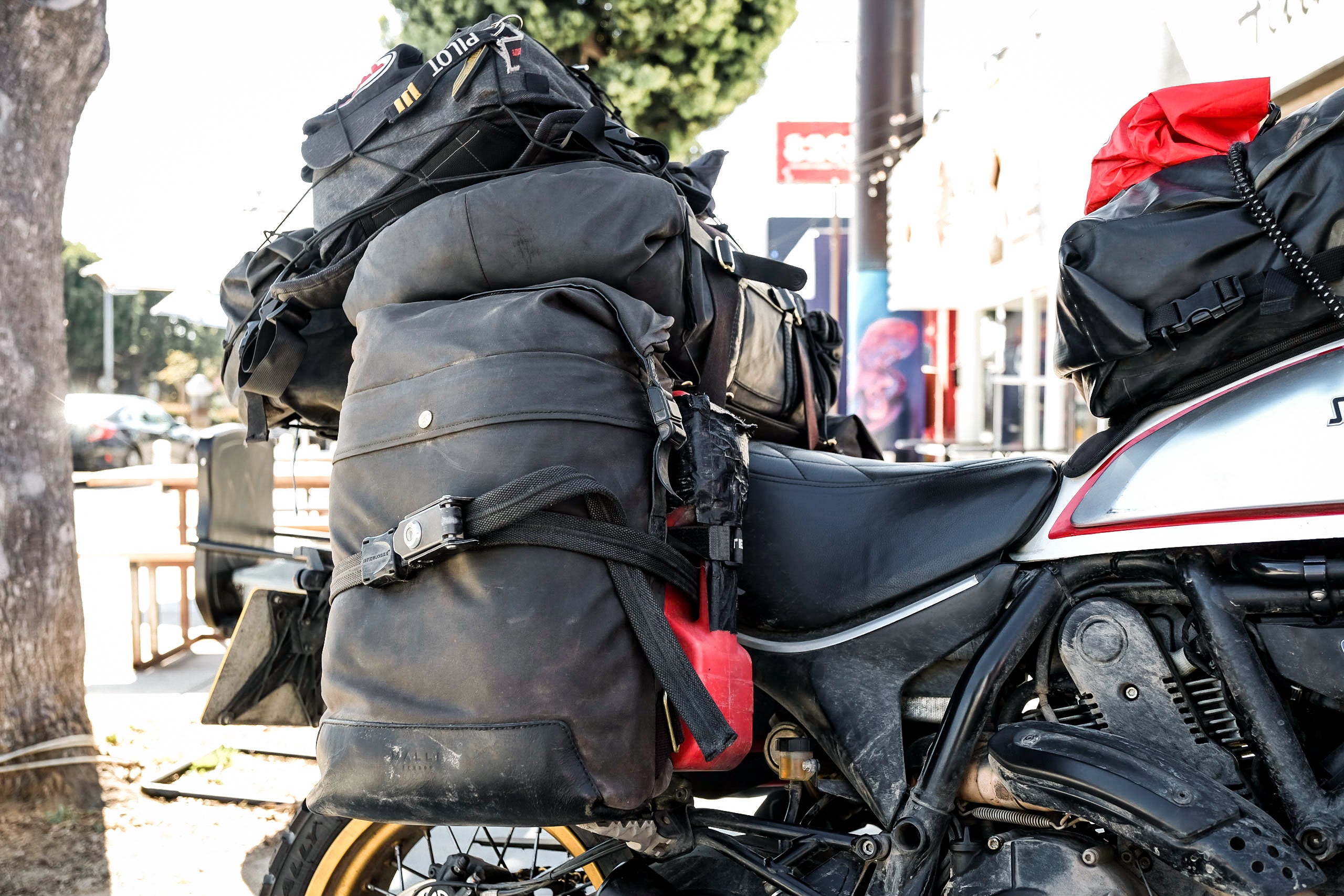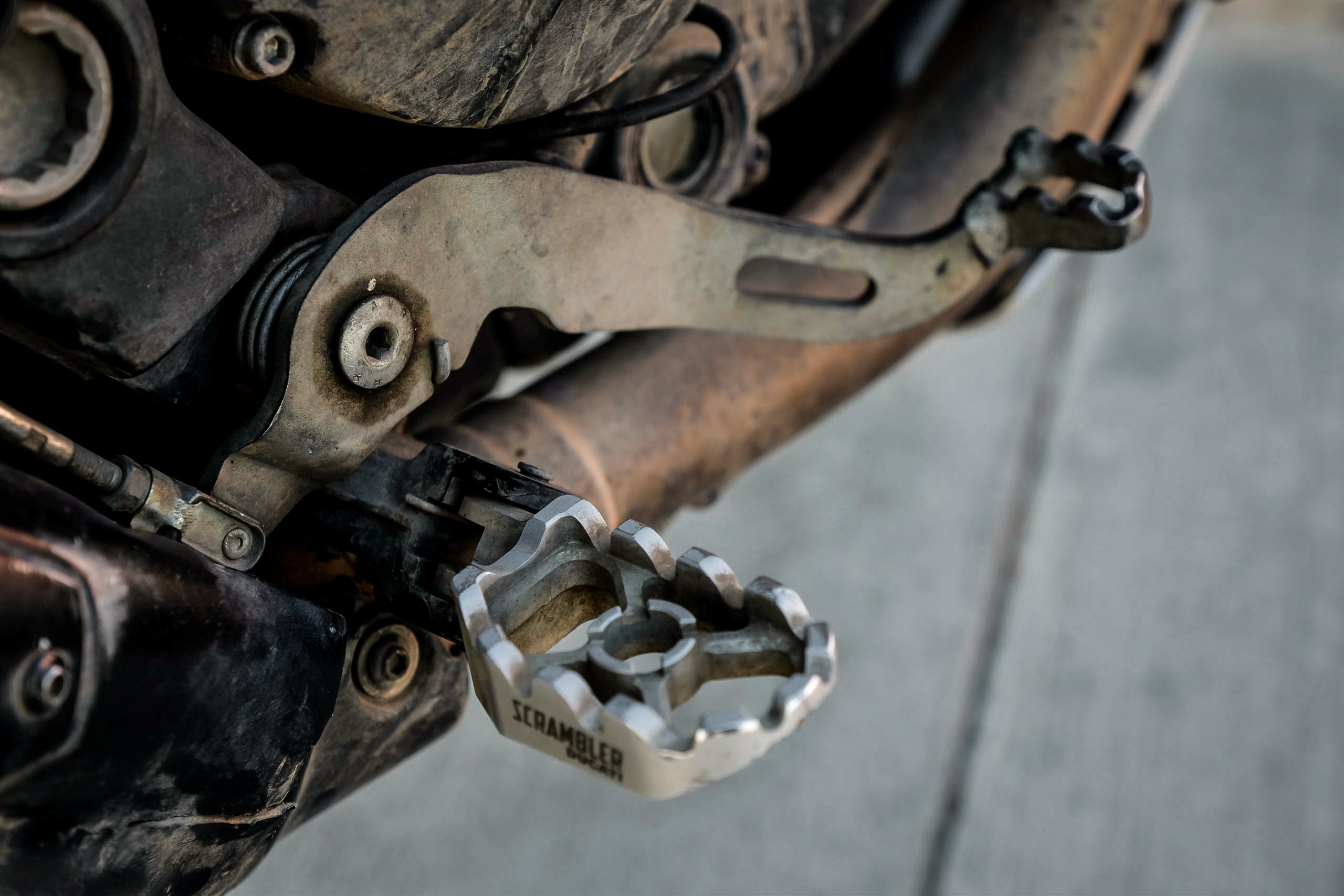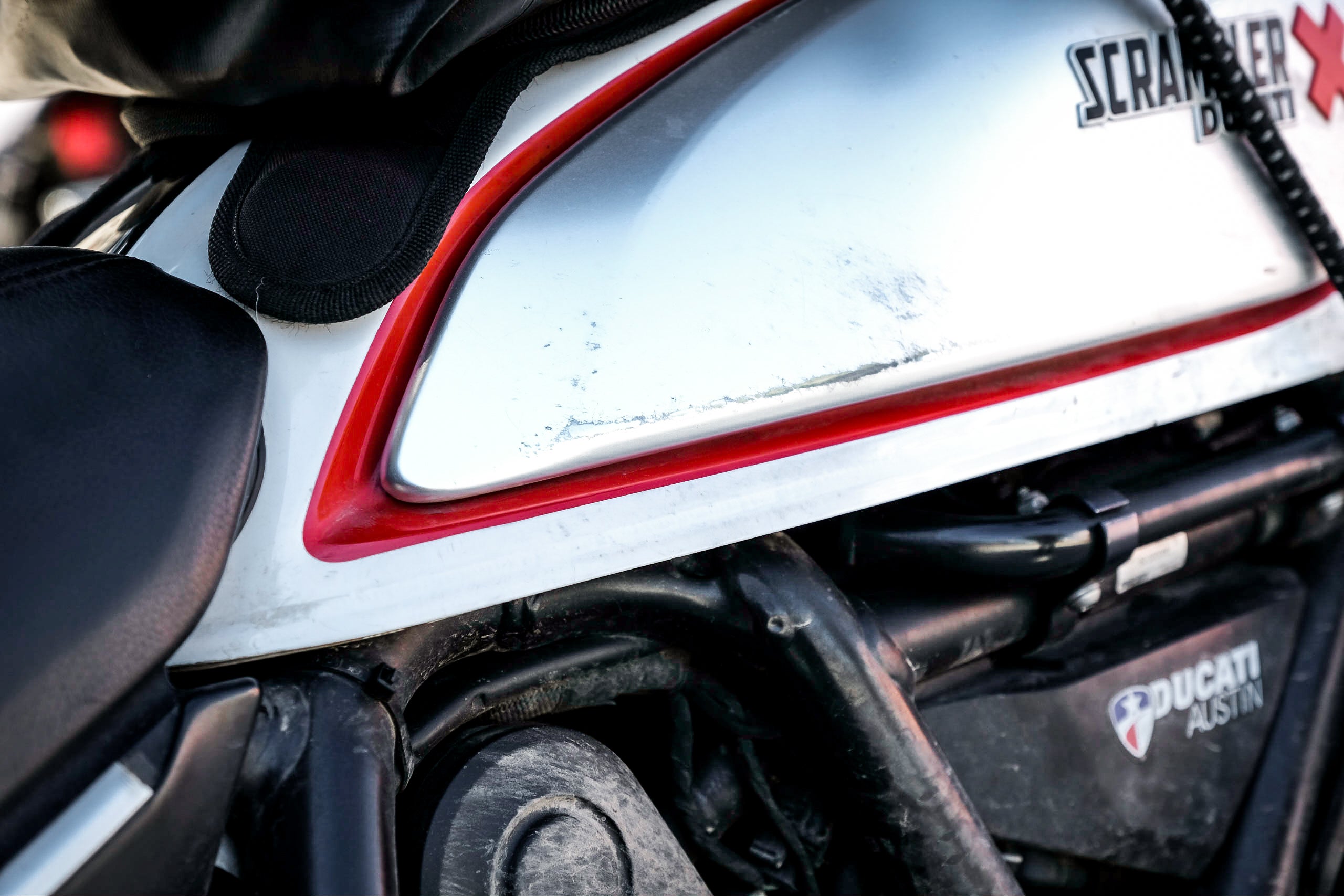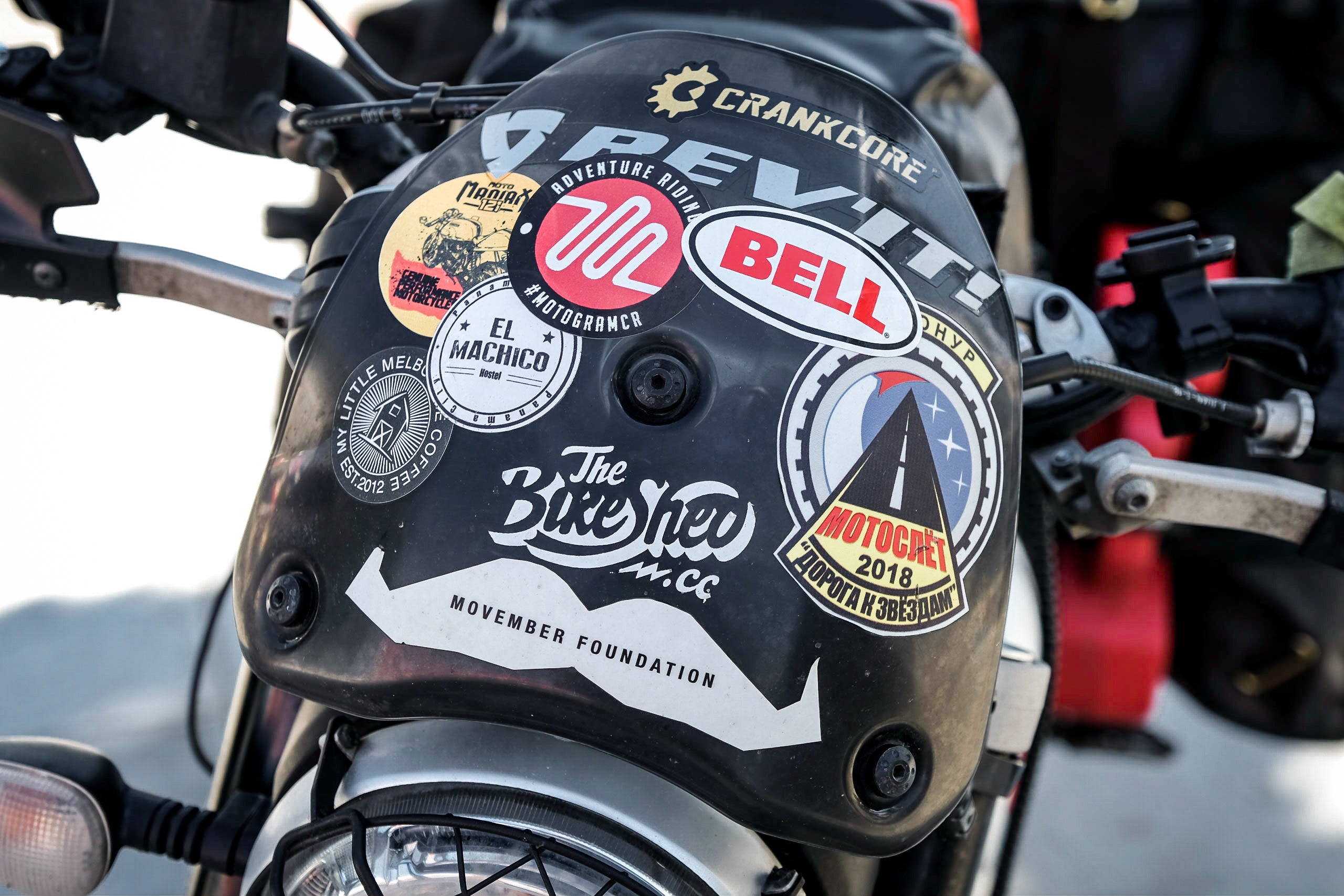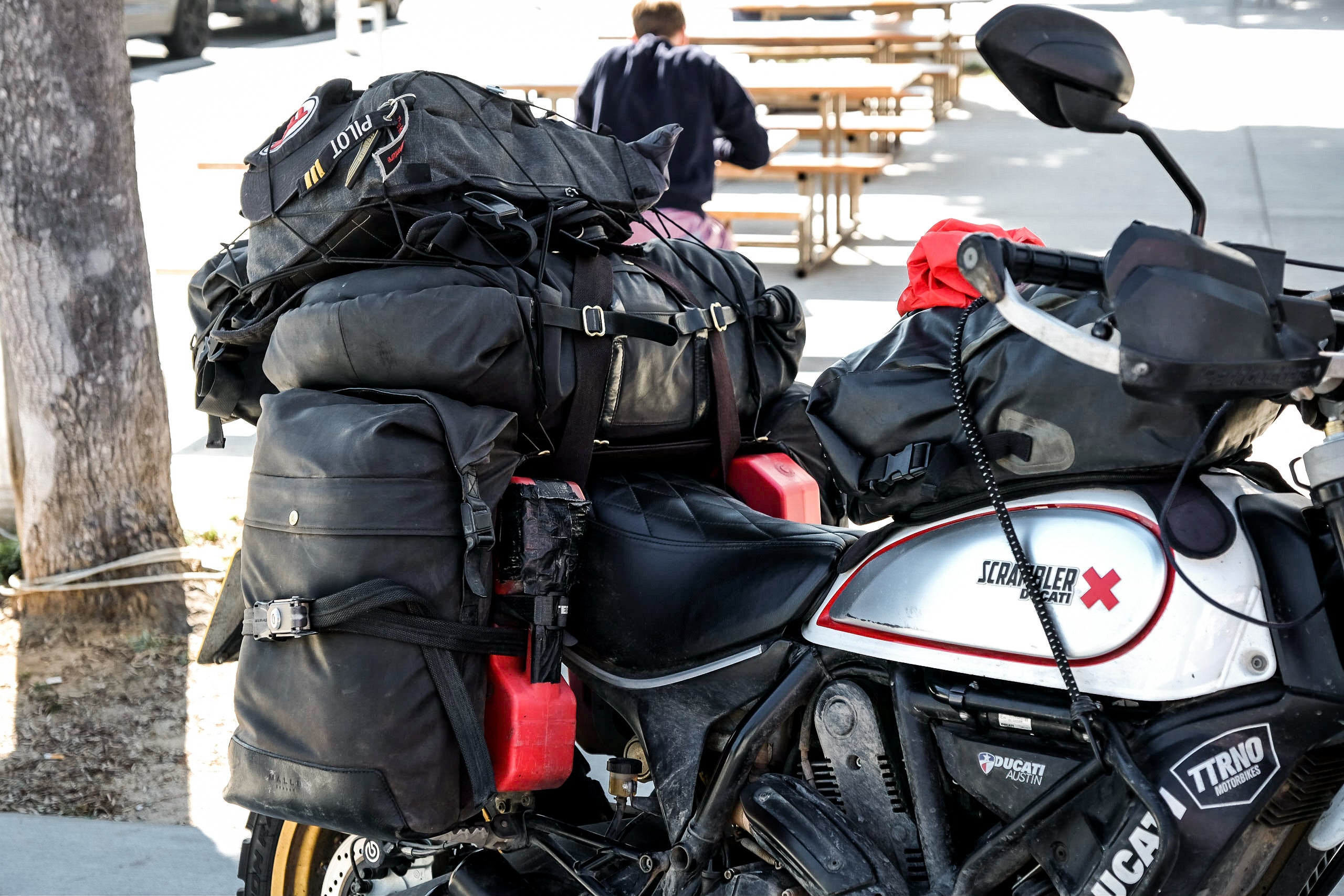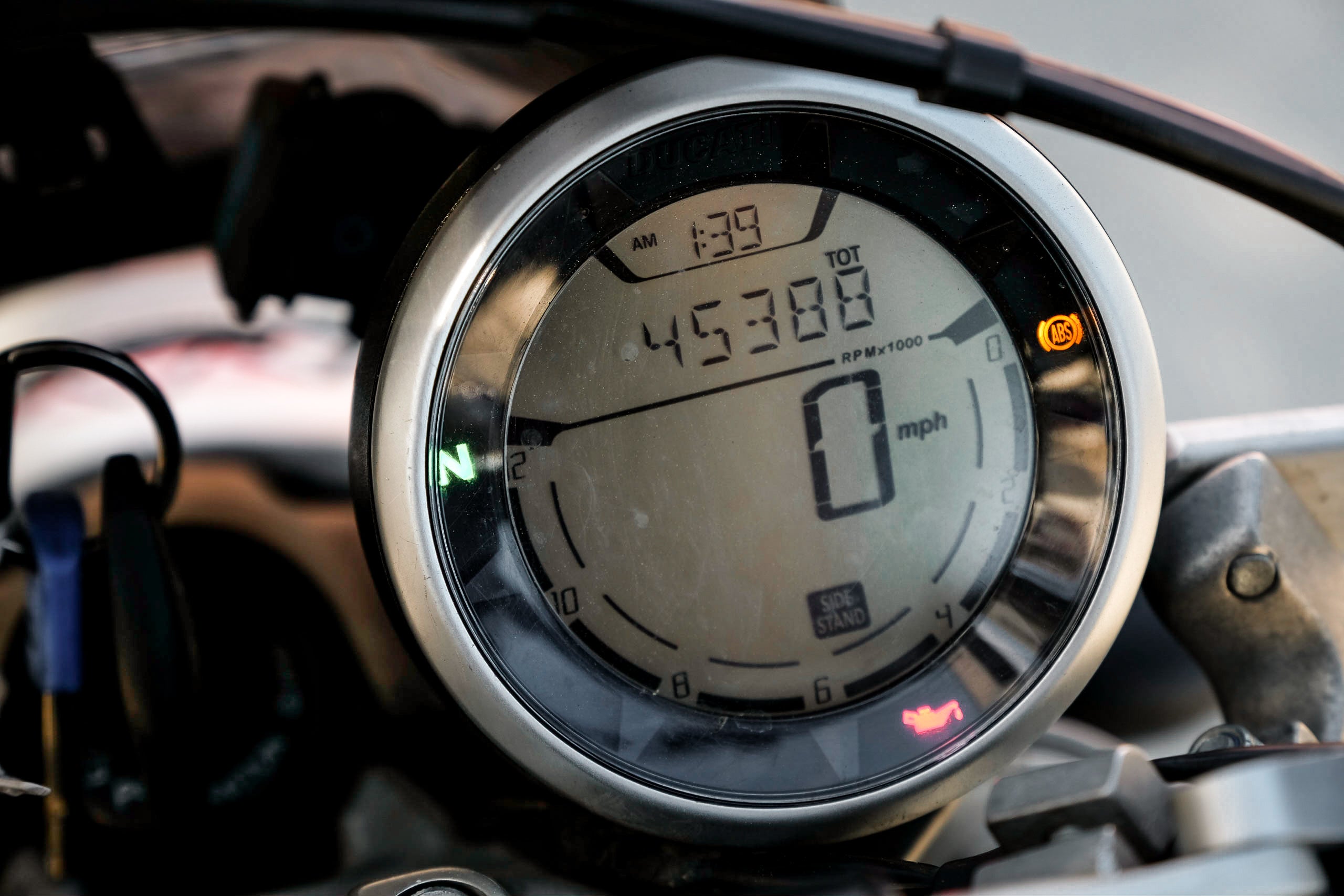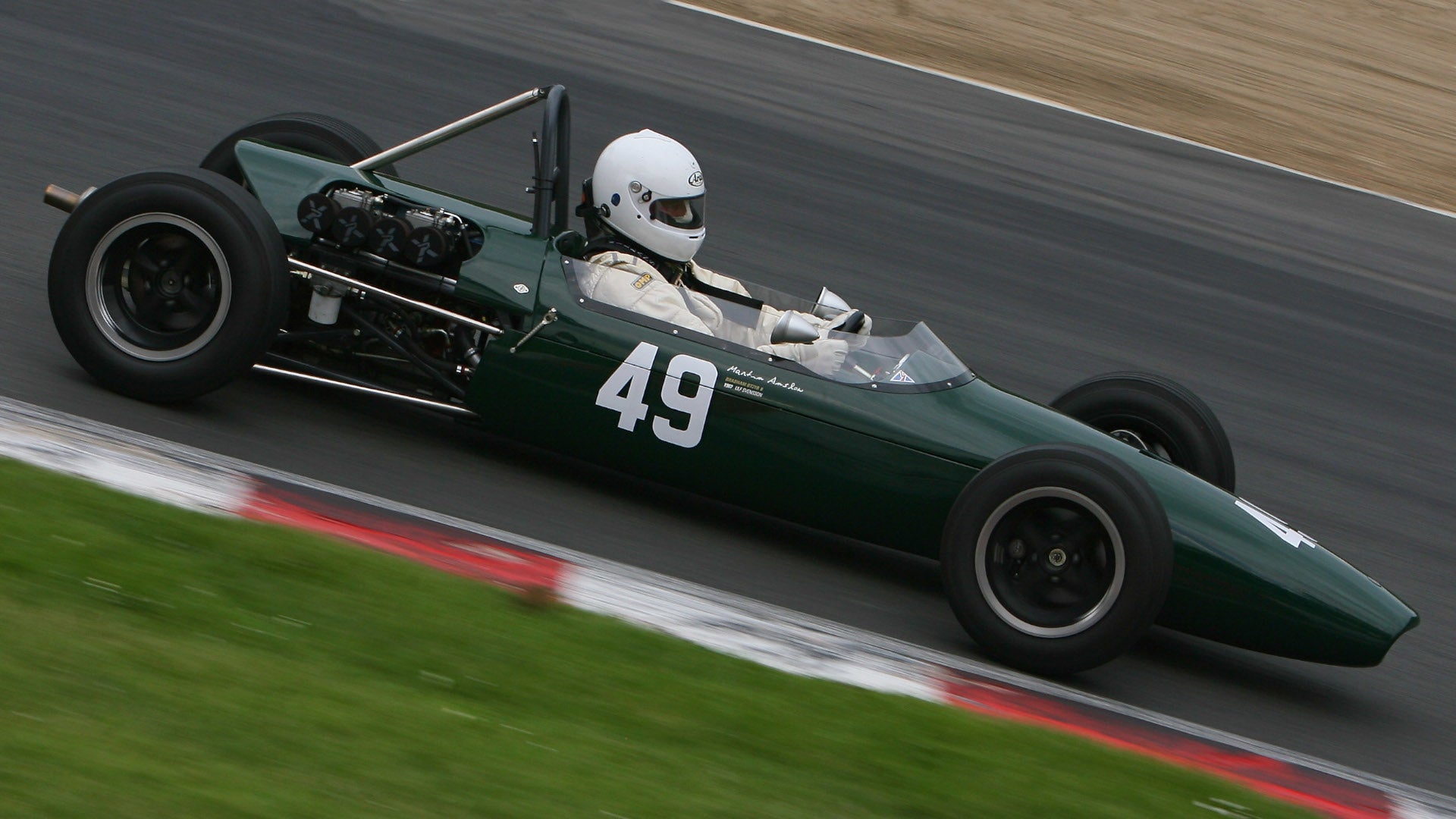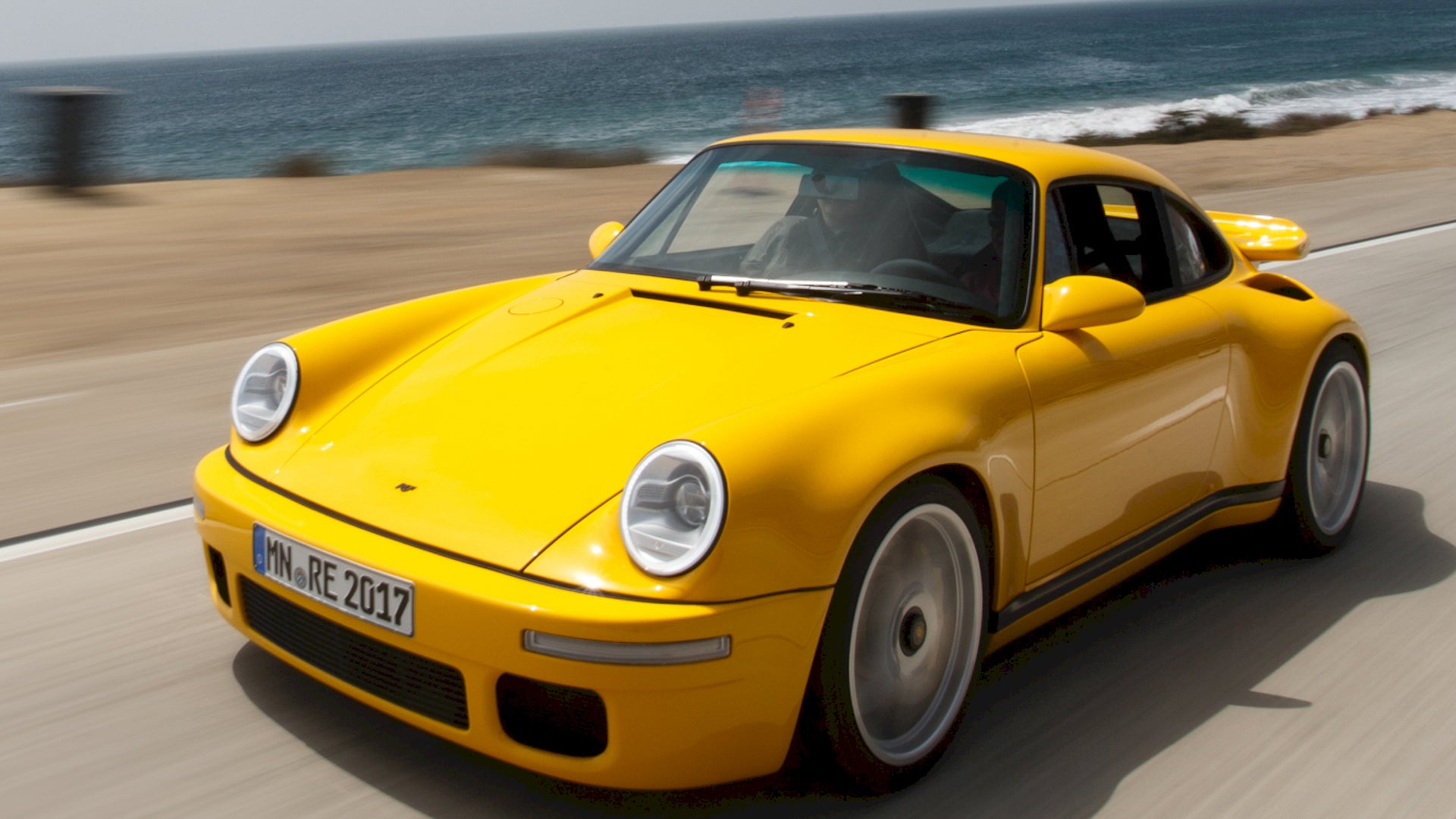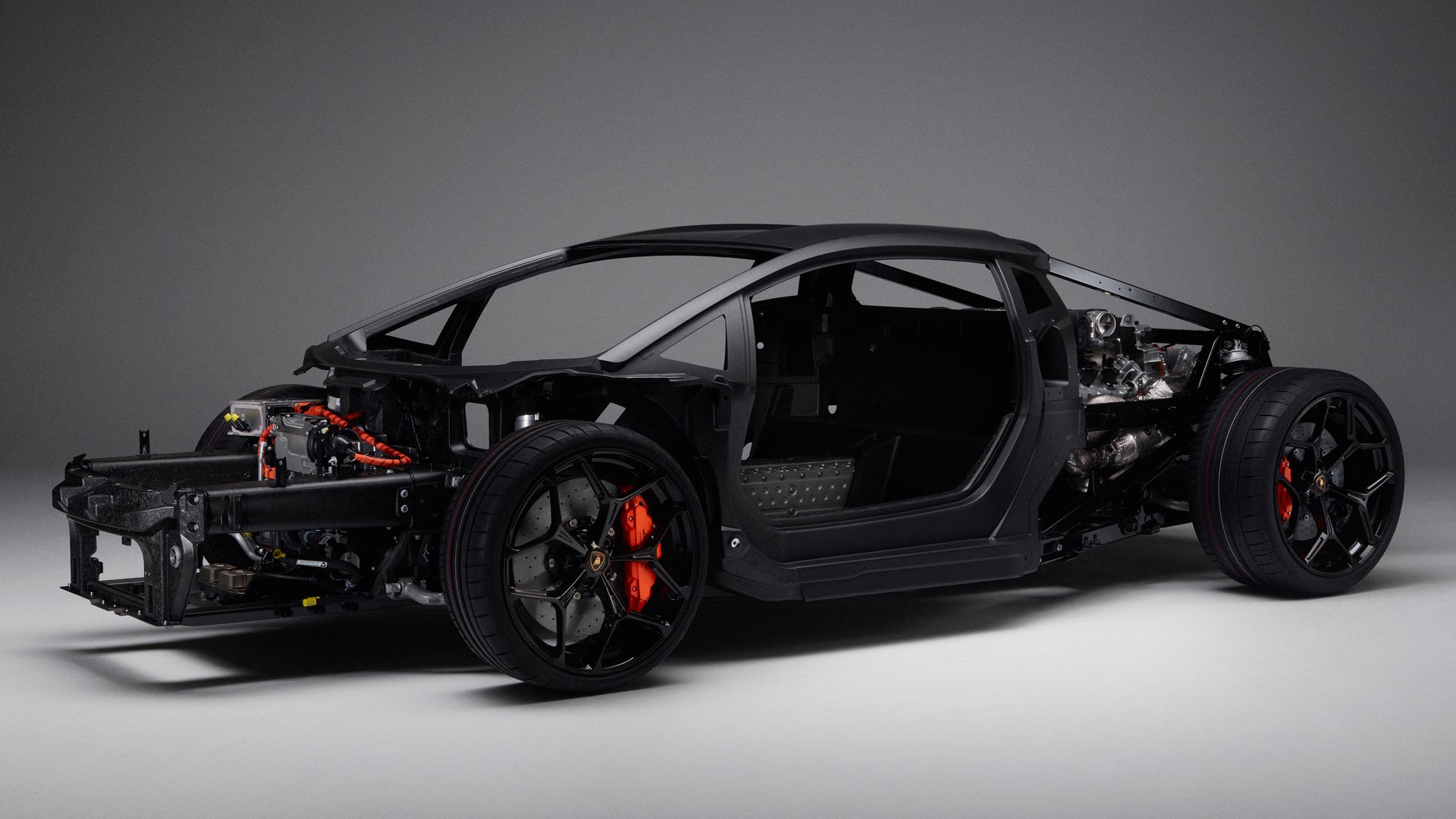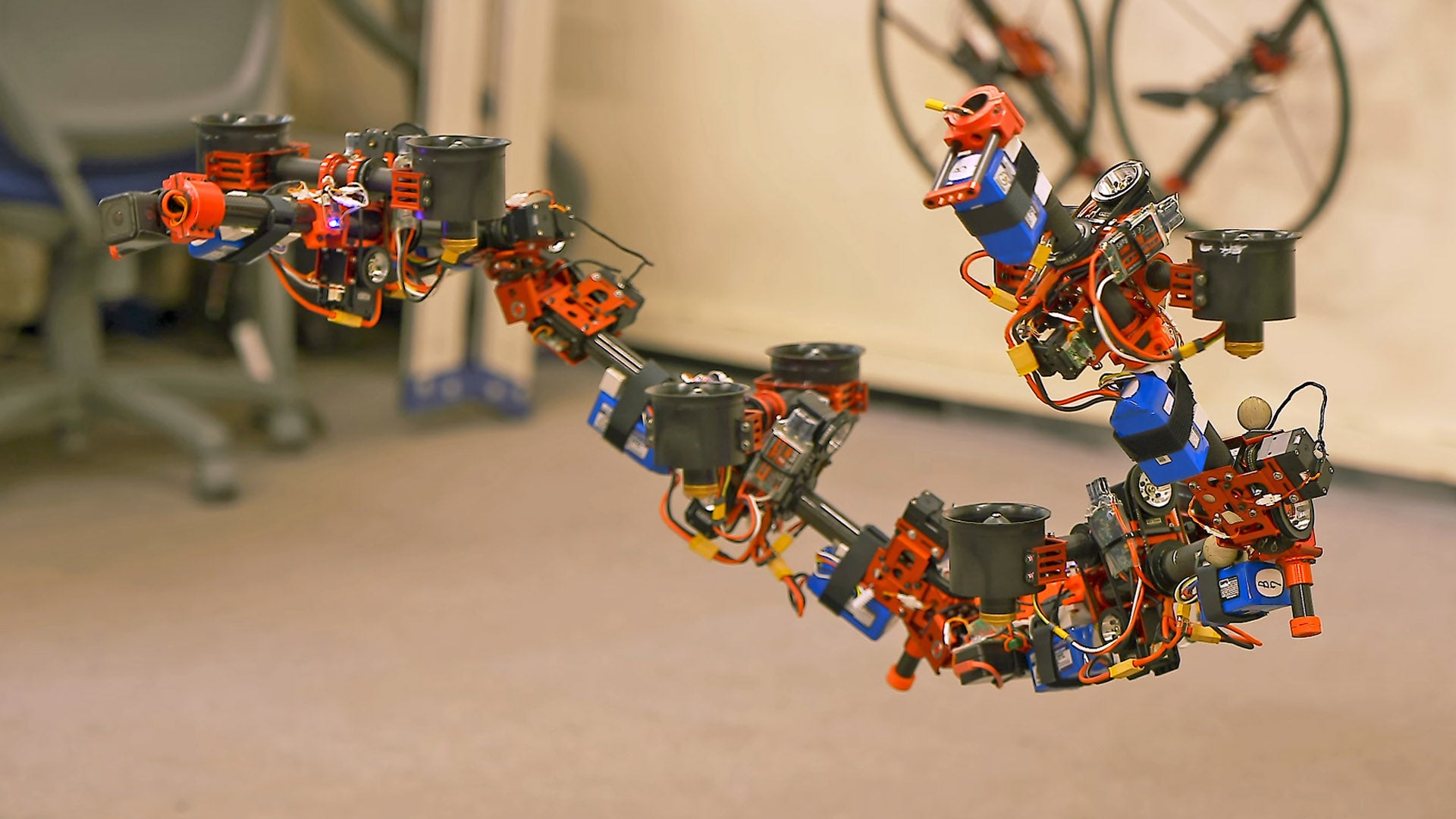Young Henry Crew from London, England, is on his way to becoming the youngest person to circumnavigate the world by motorcycle. The current record holder is Kane Avellano who completed a route in 2017 at the age of 24. Crew is a year younger than that. He embarked upon his journey at the age of 22, and he's only days away from clinching the crown.
We caught up with Crew over coffee in downtown Los Angeles and talked about how he got into motorcycling, the dark and light moments of his travels, wrestling with mental health and depression, and what the hell he's going to do when he's done with this [knock on wood].
Right now, Crew is riding his Ducati Desert Sled east along an efficient southern route. Eventually, he'll cut up the eastern seaboard to New York, where he and his Ducati will board a plane to Spain. You can follow his journey here or on Instagram @henrycrew.
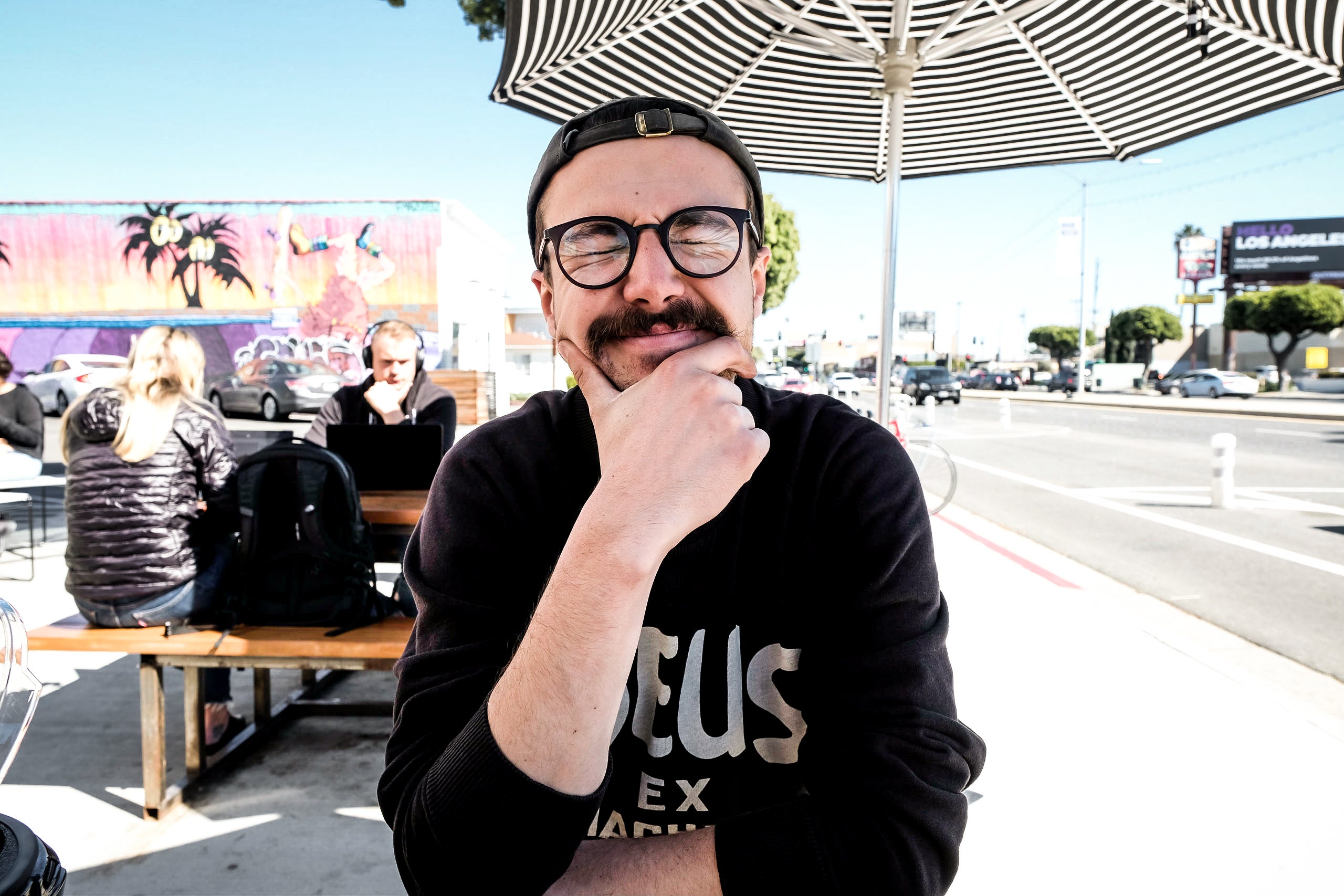
The Drive: I guess the first question would be Why are you doing this?
Henry Crew: Well I guess the appropriate answer would be why not? I just felt like I needed to do something. I remember reading the story about Kane Avellano (current record holder) and thought to myself, yeah I can do this. I didn't know how old he was at the time and that really wasn’t a factor in deciding to do it.
I guess that begs the question—and I am sure a lot of people are curious to know—is how have you gone about funding this trip?
I had savings from working for three or four years, and when it came time to say, "Yeah, I'm going to do this trip," I was able to move back in with my parents for 10 months. I was living rent free and just saving every penny I made. I even took out a loan to cover the extra costs that I was unable to save on my own.
Did any manufacturers or sponsors provide any financial backing for your trip?
Crew: None of my sponsors have financially backed the trip. The motorcycle industry has seen a contraction in demand, and the support is just not there. Also, I am sure they get bombarded by proposals like this all the time. Ducati did step up and loan me a Desert Sled, and they are covering servicing of the bike and some shipping and freight services. Rev’it has also provided me with gear and Malle with the bags. There is support, but no one has put money in my pocket.
So the costs you are on the hook for are…?
Food, fuel, the occasional motel. But the really great thing is how I have been able to stay with people through Instagram. In all, the cost of this trip is probably just over $30,000.
What's it like interacting with the global motorcycle community?
When I left London, I was super pessimistic‚and I’ve heard it's similar here in LA—where everyone stays in their own lane with their blinders on, focused on themselves and not really those around them. You kind of become a victim of your environment. But when I ventured out, I was humbled by the generosity and kindness from complete strangers, whether they are bikers or not.
Here we sit in LA, and almost everyone around us is in their own cocoon.
Yeah, but everywhere else in the United States, I've found I have to plan extra time into my travel days. Inevitably, when I stop for gas, someone will approach me and talk for 20 minutes about my trip or have questions about the bike. Not when I come into LA though. Here, no one gives a shit.
You’ve been on the road for close to 8 months, and you began in London. What was the route?
I left London, made my way through most of Europe to Russia, Kazakhstan, Azerbaijan, Iran, Pakistan, India, Myanmar, Thailand, Malaysia, Singapore, Australia. Then I flew to South America. First in Chile, then Perú, Ecuador, Colombia, Panama, Costa Rica, Nicaragua, Guatemala, Belize, El Salvador, and Mexico. I entered the U.S. in Texas, went to Louisiana, then west toward Los Angeles, up to Portland, Oregon, back to LA. Then I'm going to cross along the southern route to Georgia and up to New York. I’ll fly from NY to Spain, and ride back to my final stop in London.
So how did you cross between continents and the impassable geographic areas?
We flew the motorcycle between Malaysia and Australia, and then from Australia to South America. An airplane was the way to go because shipping a motorcycle by sea takes too long and there's no guaranteed arrival date. You could wait anywhere between three to six weeks and for the nature of my trip, it really wasn't viable. I also needed to ferry the motorcycle from Colombia to Panama because of the Darien Gap.
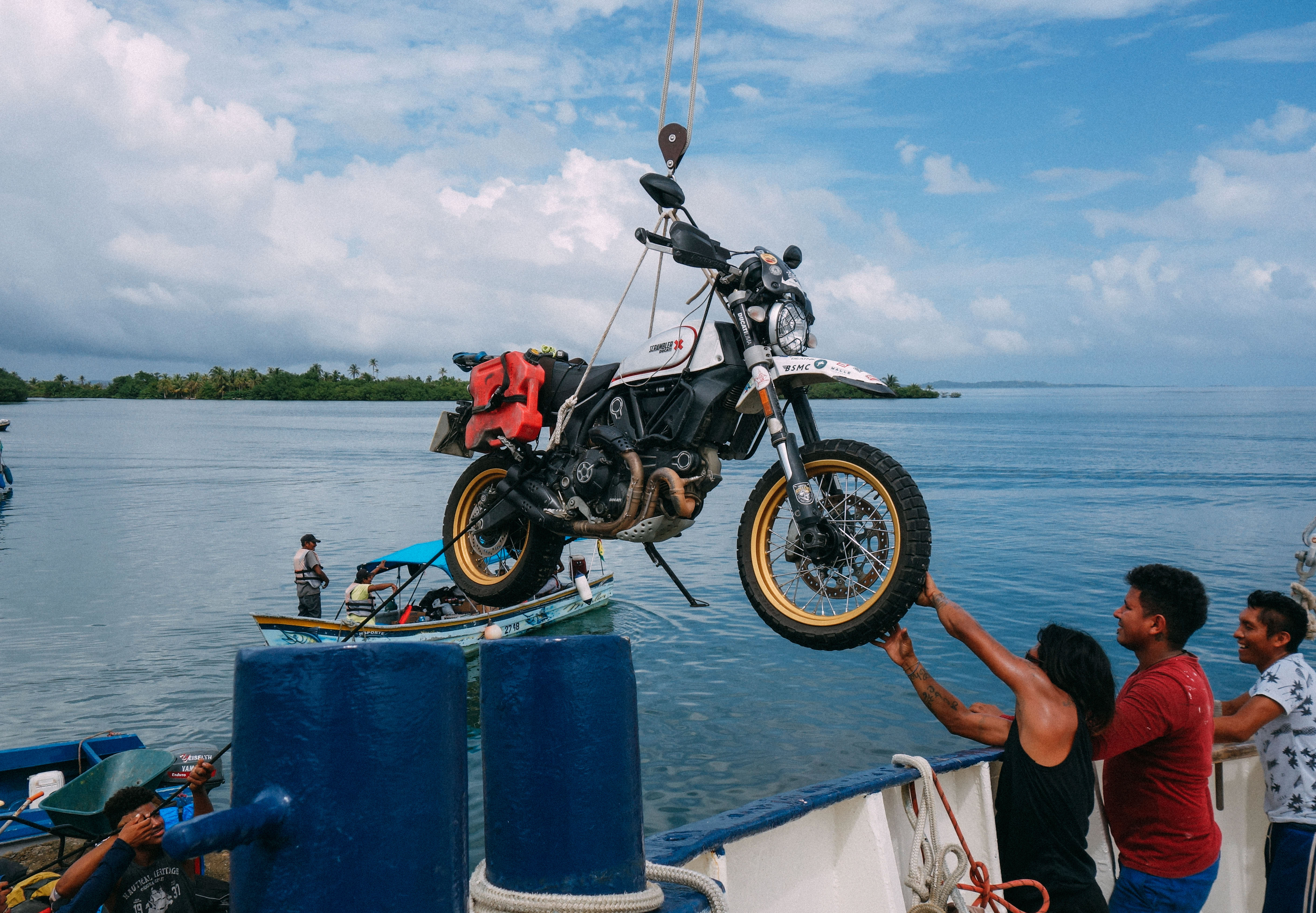
You’re riding solo around the world with no support vehicles, so there must have been a couple of hairy situations. What ones really stick out?
There are so many things that can go wrong. You’re in the middle of nowhere and you get a puncture or the bike starts rattling and you are 500 miles from any kind of assistance and you think, Oh, this is not a good time for this to be happening. I can fix parts of the bike, but when it comes to the engine, really only a Ducati mechanic can really work their way around it. I have to say, overall I have been incredibly lucky.
There was one instance when I was in Peru or Chile, I set off for the day having thought, It’s been forever since I had a puncture. Of course, it happened when I was in the middle of a canyon with no cell service and I had run out of tire plugs. I managed to get the bike down to a local village, but they didn't have a tire repair shop. But the villagers were very keen to help, and they flagged down a pickup truck to take me and my bike to a larger town. Four guys lifted the bike up into the bed and I hopped into this guy's truck for a half hour until we reached the tire repair place. Then I was on the back of the road. I thought the fix would last about a day, but they patched it so well it lasted three weeks, until I had the tire replaced.
Weather also has made this trip incredibly insane. Monsoon season in India and Myanmar made the roads a complete mess. Some bridges were completely flooded and swept away, and there were water crossings that were a couple of feet deep. That was something new for me. In the UK, we don't have terrible roads and massive flooding. And these crossings were deeper in some parts, shallow in others. But you just hit the throttle and keep going.
Probably the most surreal experience of this trip came when I was in Iran. I ran out of money there because they aren't part of a centralized banking system. I figured I would just try and get across the border into Pakistan where I could pull out some cash. However, the border closed early because of Ramadan, and I was stuck in the customs office. The border didn't open until noon the next day, so I wasn’t able to get to the capital city of Quetta in the province of Balochistan. Because that region is a terrorist hot-spot, you can't drive through it without a police escort.
So, one night I had to stay in a prison.
An actual active prison with inmates?
Yeah, but a small prison—the size of this coffee shop. You have to stay in certified hotels in that region or prison. It’s for your own safety. So I slept on the roof of the prison and it was totally surreal. My escorts introduced me to all of the prisoners even though only one spoke English. He was studying computer science and then murdered someone. There was this 10-year-old boy, too, who was running around getting everyone tea and sweets and I asked why he was in prison and it turns out he was caught wearing a suicide vest. He was really the sweetest kid, but he was just brainwashed, I guess. So that was a standout week.
I bet.
When I reached Quetta, I stayed at a place called the Bloom Star Hotel. It was worse than the prison. No AC, TV, internet, hot water. It was noisy, and food was impossible to come by because of the holiday. We were stuck eating chicken neck curry and moldy naan. It’s where a lot of motorcycle adventurers stay because it’s cheaper than the other certified hotel in the capital and there are motorcycle stickers everywhere.
What's it like to ride in the Middle East?
Well, the pace is much slower, there is a lot of bureaucracy and red tape, you have to get forms filled out and papers stamped and it takes a long time to get anything accomplished. I never once felt in danger or threatened. Everyone was really nice and friendly.
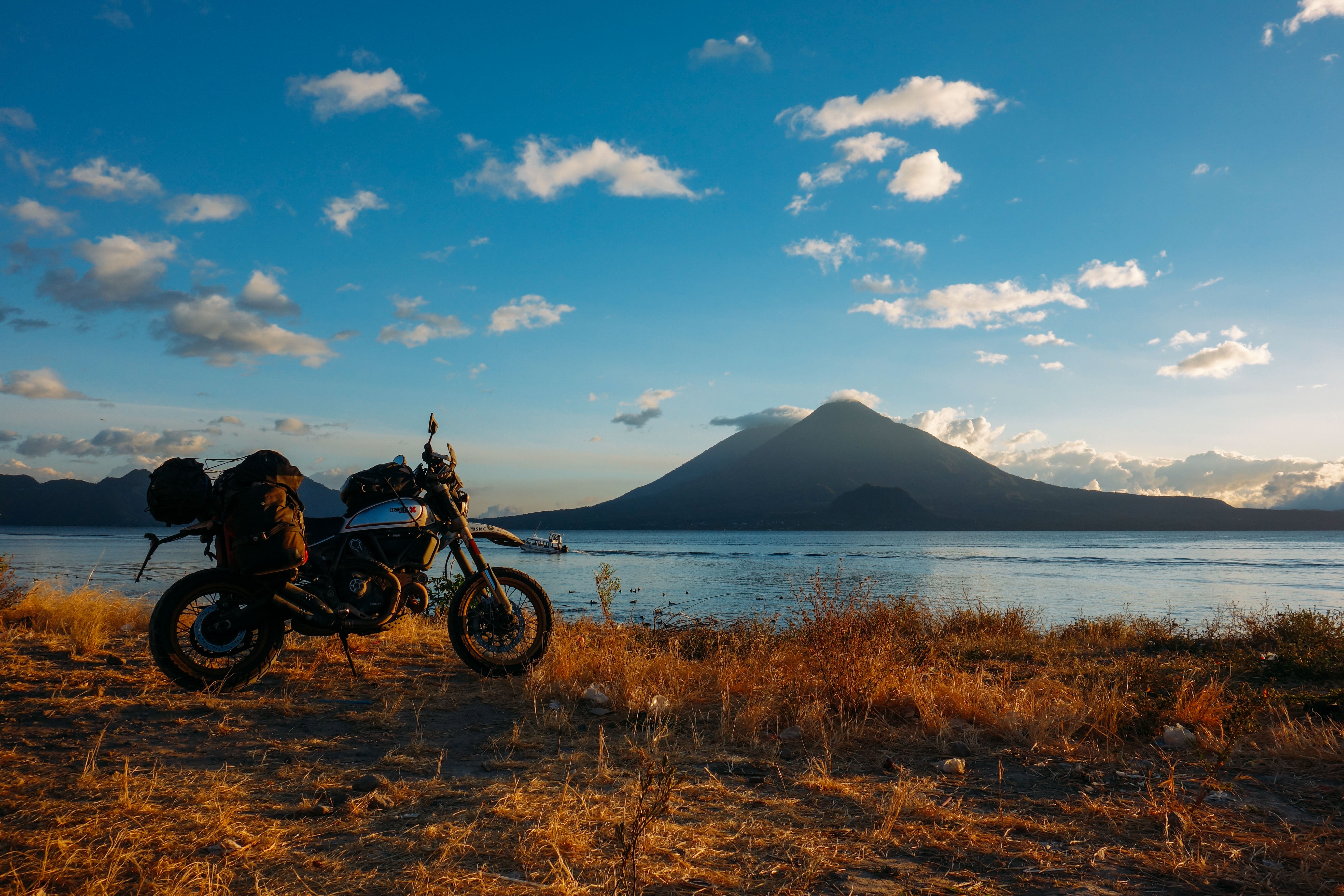
There are so many physical challenges we have to contend with on a motorcycle, but what about the psychological challenges of this trip?
Sitting still is also one of those things that seem to have a significant toll on me emotionally. There was this time in Kazakhstan when I stuck for a month waiting for a clutch and then 3 weeks in Louisiana for a similar issue. Those kinds of things are frustrating because they eat up scheduled time. I allotted three months to explore America because there is so much stuff I want to see, but now a third of that is gone.
Riding through Europe and Australia was easy, but when you have deadlines, places you need to be and ferries you need to catch—those events weigh on you mentally. When I arrived in Santiago, Chile, I experienced a massive culture shock. I was somewhere where no one speaks my language, I was in a hostel with no windows, I couldn't get any good food, and there were a ton of religious holidays on the weekend I flew in so nothing was open. To make matters worse, I couldn’t get my bike out of customs because I couldn’t speak Spanish and everyone there was really unhelpful. It took nearly 5 days to retrieve my bike from the airport.
Eventually, a guy from Ducati helped me out and we left. We drove two miles down the road to stop for gas and his car was broken into and robbed. It was one of those weeks where I was asking myself, Do I really want to be doing this? I feel like I was there for too long and I started to have these really negative feelings. That was the first time I felt seriously demotivated. I had such a great time in Australia and this was the polar opposite.
You know, motorcycling is something that has always helped my mental health. I had issues with depression and anxiety when I was about 14, and it is something that got worse when I was at university.
Are those feelings stress related?
Yeah, I just couldn’t cope with juggling all the new responsibilities and drinking age in the UK is 18 so you are adding in the shock of moving out, deadlines, work, drinking loads of alcohol, managing my own finances, paying rent, and then there’s relationship stuff and having a couple of family members died—it all happened at the same time. This is when I got into motorbikes. It was something I always wanted to do.
You are partnered with the Movember Foundation, which is a non-profit that tackles men’s mental health issues in conjunction with various types of cancers. They are also the global charity partner of the Distinguished Gentleman’s Ride, which you’ve done. How did you get hooked up with these organizations?
I got into bikes because of the whole new wave cafe custom/cafe racer thing. My first bike was a 1982 Yamaha XS400 chopped up into this brat style. It was a piece of shit that only ran every couple of weeks. At that time, the Distinguished Gentleman's Ride was only a couple of years old, and it looked amazing. I didn’t have any friends who rode motorcycles, so riding in the London DGR with 2,000 riders was the first time I ever rode in a group. My bike broke down and there I sat in Trafalgar Square, waiting for the rescue van. That bike never ran again. I sold it and bought a modern classic Kawasaki W800.
I was aware of Movember for a couple of years even though I struggled to grow a mustache—I’ve managed to grow one this trip. I called them up, told them what I was doing, and that I wanted to raise money for their cause and make it a bigger thing than just me riding around the world for a record. It all came together rather well. Movember helped sort out the Ducati sponsorship and introduced me to so many good people in the motorcycle industry.
Did you have the chance to meet the DGR team while you were in Australia?
Crew: Yeah, I met Mark Hawwa the founder of the DGR and he’s such a great guy because I was really struggling financially at that point with getting the shipping of stuff from Malaysia to Australia covered. We had been talking through Facebook and he had asked if any of my sponsors were assisting with the trip financially? I told them they were not except for just the stuff they were giving me. He was pretty disappointed by that and decided to help me out. He’s a pretty stand up guy after only talking to him for 2 days.
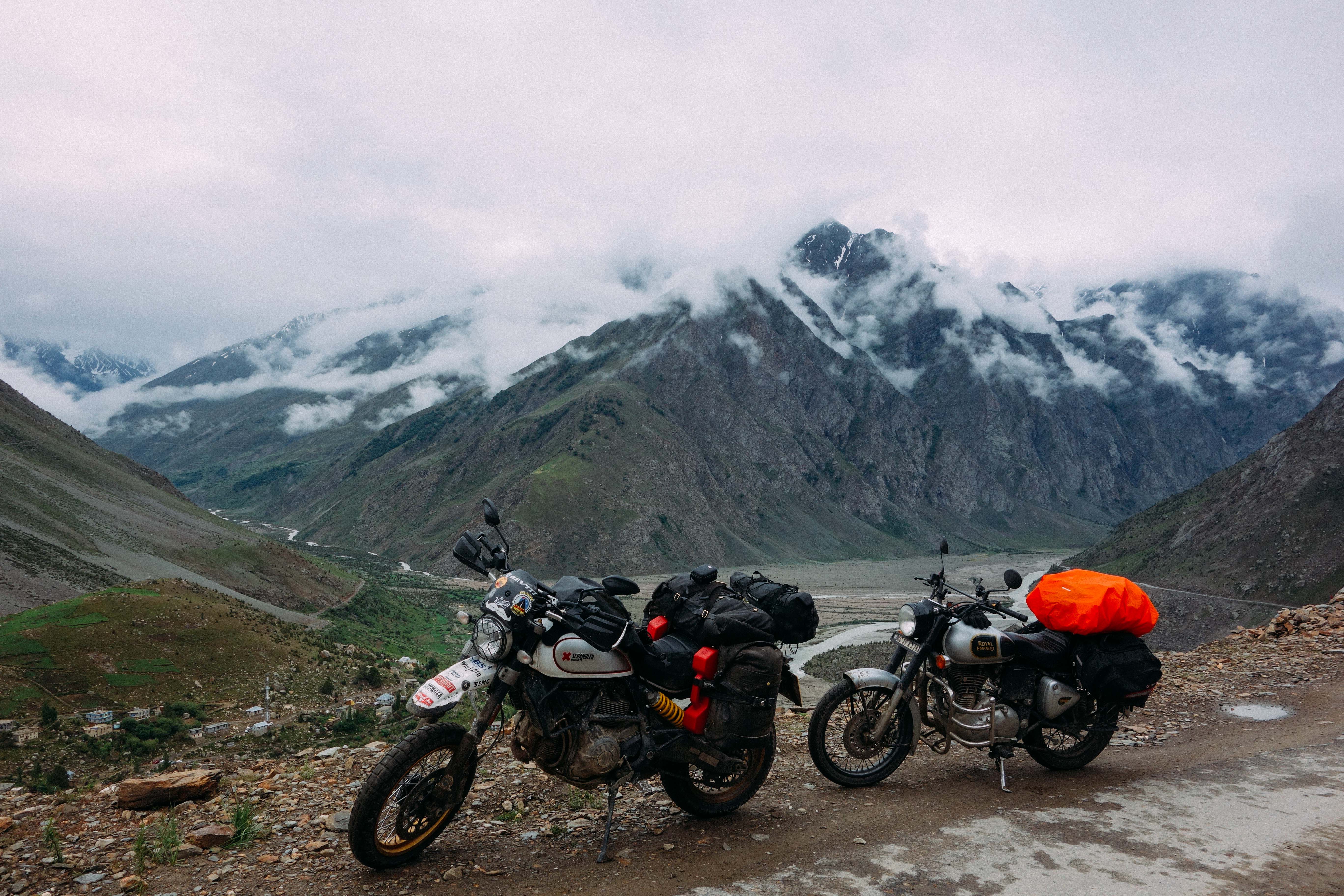
You said earlier that motorcycling has served as a kind of therapy, but how have you learned to handle your mental health?
When I am on the motorcycle it's so easy because I don't have to talk to anyone and I can just think things through. I really suck at talking about myself and my personal issues. I never talked to my family at all and I knew friends of mine were dealing with similar problems and we never really talked about it.
How has that changed?
I did a video about DGR in 2017 for BBC3. I was gearing up for this trip, and it was on the topic of mental health. It was the first time my family had heard I was dealing with these issues. I got a call from my Mom and she was like “What?” It felt easier to speak to someone I had no relationship with than someone who actually cares about me and then to feel guilty that you are disappointing them because you don't have your shit together.
Once it is out in the open, it becomes a lot easier to talk to friends and family about it because it's a part of who you are and there is an understanding that it exists. So talking about it becomes rather fluid. It’s the jump to admit it, that’s the most difficult part.
Do you feel like you have more of a command of your emotions now that you’ve acknowledged them are you more comfortable expressing them?
A bit. I am kinda triggered by failure and a lot of the time, when I think I'm not failing or not progressing in the ways that I want to, then I get into my own head and that is when I lose motivation and then I slip into this depression. And when I'm depressed, I am not super sad—which is what most people attribute to depression—it's more of a spectrum that is slightly different for everyone. When I am depressed I become super apathetic toward everything, I don't want to get out of bed, and I feel this numbness toward everything. But having dealt with some of those feelings and speaking to people on this trip, they are there to support you. So many people deal with these feeling and to have another person aware of it they can offer perspective. One of the most dangerous things is holding in your own thoughts because they can be very self-destructive.
That is the big thing we need to do. We need to educate and make people understand there is a difference between mental health and mental illness.
So right now you’re not too far from your goal. Are you ready for it to end?
The scariest part of the trip is the ending. Because what do you do once it’s over?
Write a book?
I might try to do a photo book but a lot of that comes down to whether I can get enough momentum behind it. It’s been an amazing experience, but I'm a bit burnt out. Seeing everything that I have seen only makes me more interested in returning to particular regions to ride around those areas. When I was in Northern California I desperately wanted to take some time to see the Redwoods and walk amongst those trees. But time became a governing factor.
For now, I am going to enjoy what’s left of this amazing journey and take it all in.
